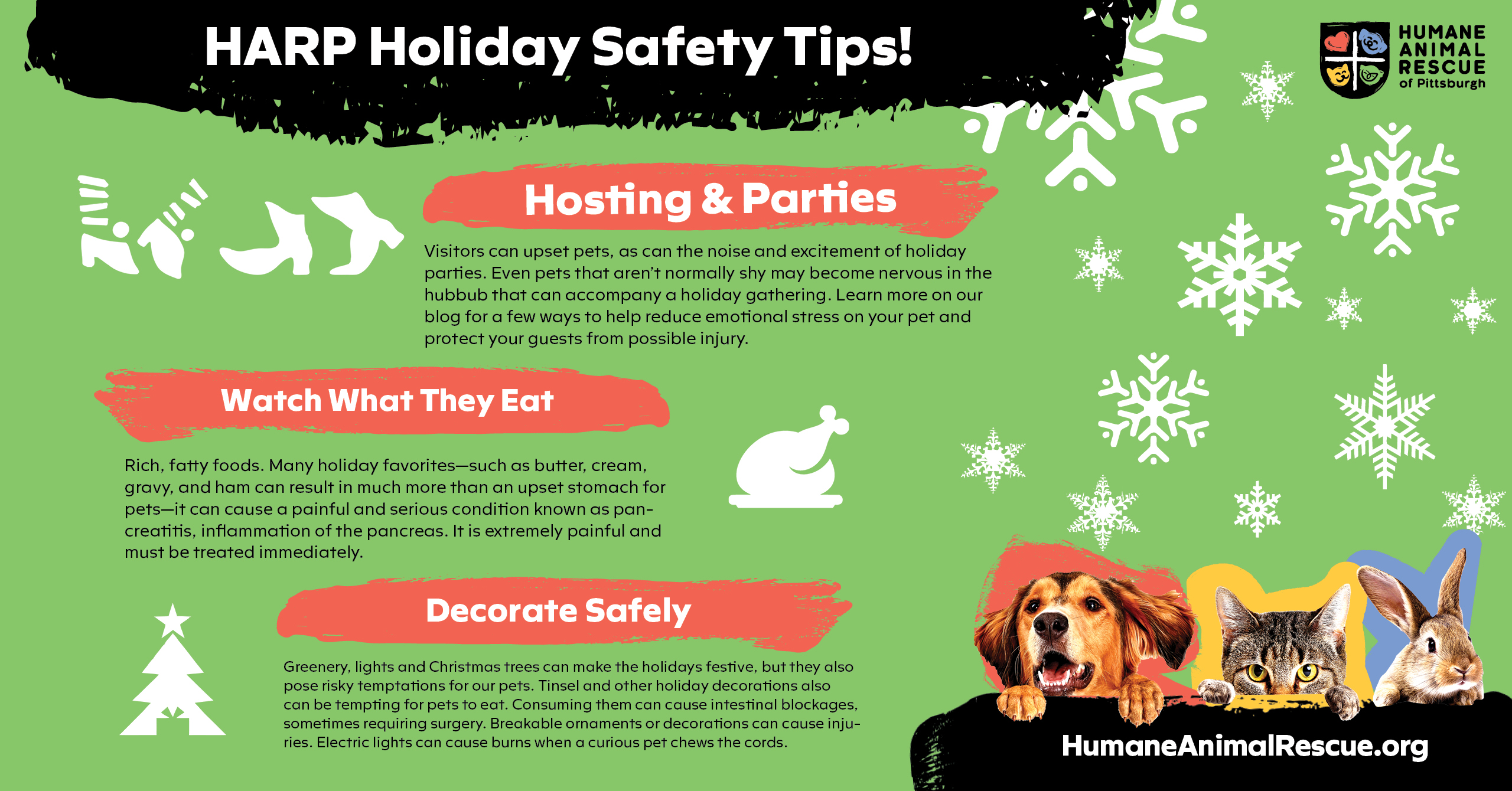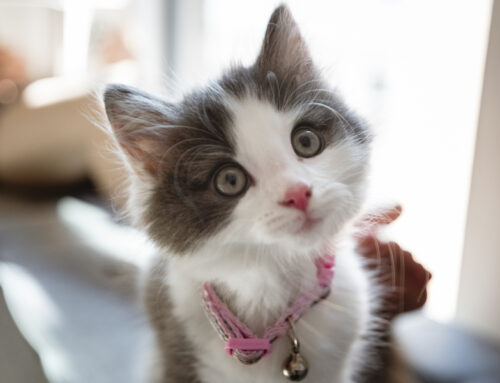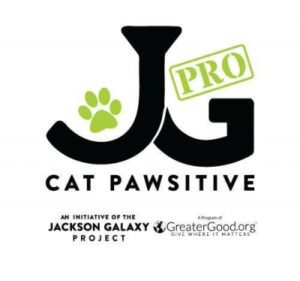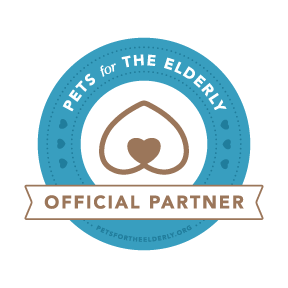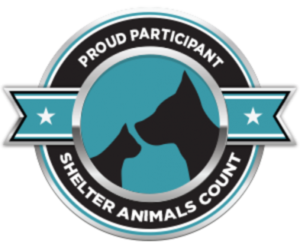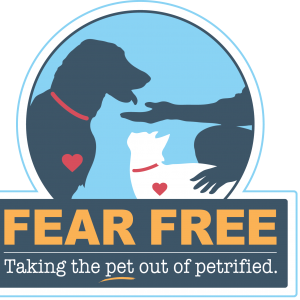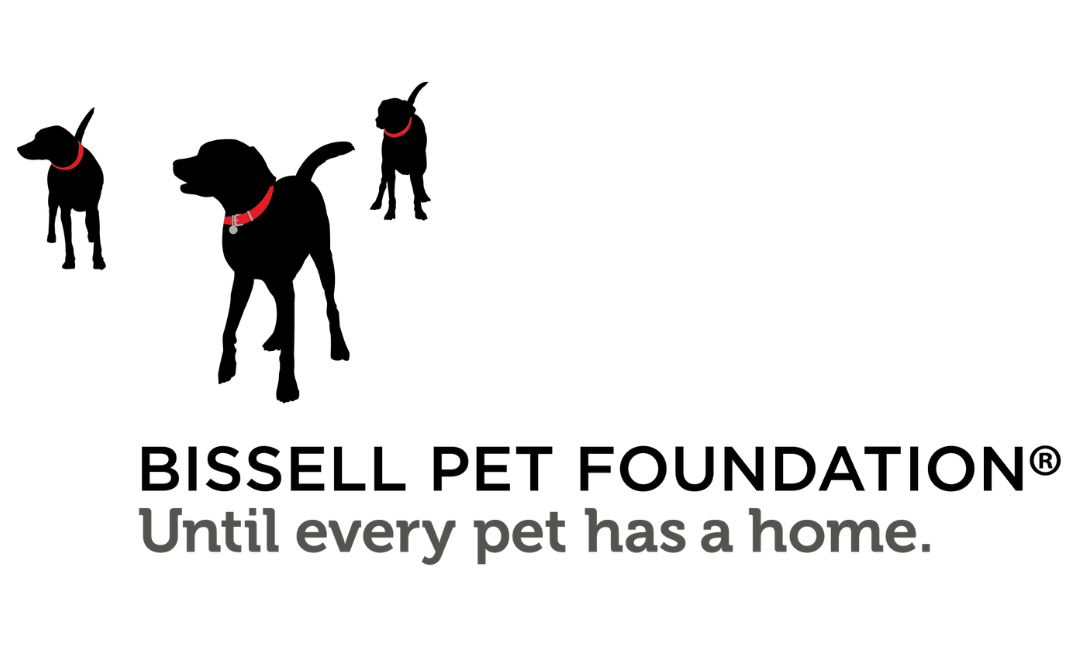Tis the season to be festive, decorate and welcome guests into your home. It may not be a time when pet safety is on your mind. “However, taking a few preventative measures before and during the holidays can help make it a happy and safe holiday season for your pet,” advises Dr. Ariella Samson, Chief Veterinary Officer at Humane Animal Rescue of Pittsburgh.
To help make sure it’s a jolly holiday for people and pets alike, Dr. Samson offers these tips:
Decorate Safely
Greenery, lights and Christmas trees can make the holidays festive, but they also pose risky temptations for our pets.
- Christmas trees can tip over if pets climb on them or try to play with the lights and ornaments. Consider tying your tree to the ceiling or a doorframe using fishing line to secure it. Water additives for Christmas trees can be hazardous to your pets. Do not add aspirin, sugar, or anything to the water for your tree if you have pets in the house.
- Ornaments can cause hazards for pets. Broken ornaments can cause injuries, and ingested ornaments can cause intestinal blockage or even toxicity. Keep any homemade ornaments, particularly those made from salt-dough or other food-based materials, out of reach of pets.
- Tinsel and other holiday decorations also can be tempting for pets to eat. Consuming them can cause intestinal blockages, sometimes requiring surgery. Breakable ornaments or decorations can cause injuries.
- Electric lights can cause burns when a curious pet chews the cords.
- Flowers and festive plants can result in an emergency veterinary visit if your pet gets hold of them. Amaryllis, mistletoe, balsam, pine, cedar, and holly are among the common holiday plants that can be dangerous and even poisonous to pets who decide to eat them. Poinsettias can be troublesome as well, if ingested it may cause irritation to the mouth and stomach and result in vomiting. If you’re planning to decorate with these plants, do your best to keep them out of reach.
- Candles are attractive to pets as well as people. Never leave a pet alone in an area with a lit candle; it could result in a fire.
Watch What They Eat
- Rich, fatty foods. Many holiday favorites—such as butter, cream, gravy, and ham can result in much more than an upset stomach for pets—it can cause a painful and serious condition known as pancreatitis, inflammation of the pancreas. It is extremely painful and must be treated immediately.
- Turkey. Avoid giving your pet turkey meat, especially fatty dark meat and skin (a small amount of unseasoned white meat is okay), and never give them any leftover bones. Not only are bones a choking hazard, but they can splinter inside your pet’s digestive tract and cause a trip to the emergency vet.
- Garlic, onion, leeks, and chives. These seasonings are common in many holiday dishes and are toxic to dogs and cats – they can cause destruction of their red blood cells. Avoid giving your pet a bite of anything cooked with these ingredients, like green beans, mashed potatoes, stuffing, or gravy.
- Desserts. Desserts like pies, fruitcakes, or cookies should be kept out of your pet’s reach as well. Many people know that chocolate is toxic for dogs and cats, but so are raisins, currants, and the popular sugar-substitute xylitol. Xylitol, even in small amounts, is toxic to dogs, so keep that slice of keto-friendly/diabetic-friendly/sugar-free pie to yourself.
- Feed them pet-friendly food options instead. While the list of foods to avoid might seem overwhelming, there are a few great options for some pet-friendly holiday treats. Raw fruits and vegetables like baby carrots, green beans, apples, chunks of sweet potato, or pumpkin puree (not the sweetened, spiced pie filling) are great options.
- Take out the trash. Not only do you not want to give your pets any toxic foods, but you want to make sure they don’t decide to dive into the trash in search of yummy scraps or sparkly ribbon and other packaging that could be tempting for your pet to consume or play with. Ask family and guests to not feed the dog and make sure your trash can is secure. Dr. Samson advises, “If at any point your pet ingests something harmful or shows signs of illness, call your veterinarian immediately. You can also call the ASPCA pet poison hotline at (888) 426-4435 for advice.”
Hosting Parties and Visitors
Visitors can upset pets, as can the noise and excitement of holiday parties. Even pets that aren’t normally shy may become nervous in the hubbub that can accompany a holiday gathering. The following are a few ways to help reduce emotional stress on your pet and protect your guests from possible injury.
- All pets should have access to a comfortable, quiet place inside if they want to retreat. Make sure your pet has a room or crate somewhere away from the commotion, where your guests won’t follow, that it can go to anytime it wants to get away.
- Inform your guests ahead of time that you have pets or if other guests may be bringing pets to your house. Guests with allergies or compromised immune systems need to be aware of the pets in your home so they can take any needed precautions to protect themselves.
- New Year’s Noise. As you count down to the new year, please keep in mind that strings of thrown confetti can get lodged in a cat’s intestines, if ingested, perhaps necessitating surgery. Noisy poppers can terrify pets and cause possible damage to sensitive ears. And remember that many pets are also scared of fireworks, so be sure to secure them in a safe, escape-proof area as midnight approaches.
- Watch the exits. Even if your pets are comfortable around guests, make sure you watch them closely, especially when people are entering or leaving your home. While you’re welcoming hungry guests and collecting coats, a four-legged family member may make a break for it out the door and become lost.
- Identification tags and microchips. Make sure that your pet is wearing an ID tag and their microchip information is up-to-date, just in case they do get out. If your pet isn’t already microchipped, talk to your veterinarian about the benefits of this simple procedure.
By following these holiday pet safety tips, you and your pets can enjoy a safe and happy holiday season.

